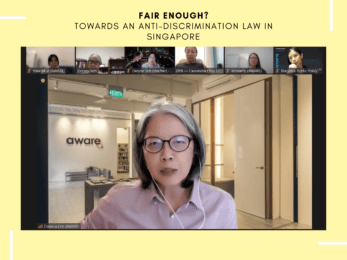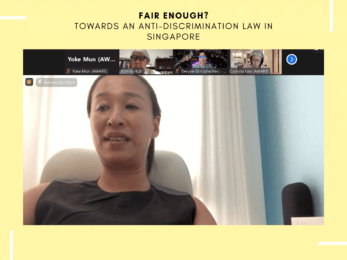-
Advocacy Theme
-
Tags
- Abortion
- Adoption
- Caregiving
- CEDAW
- Disability
- Domestic Violence
- Domestic Workers
- Harassment
- Healthcare
- Housing
- International/Regional Work
- Maintenance
- Media
- Migrant Spouses
- Migrant Workers
- Muslim Law
- National budget
- Parental Leave
- Parenthood
- Polygamy
- Population
- Race and religion
- Sexual Violence
- Sexuality Education
- Single Parents
- Social Support
- Sterilisation
- Women's Charter
A Recap: Fair Enough? Towards an anti-discrimination law for Singapore (online panel)
November 19th, 2021 | Employment and Labour Rights, News

Written by Erynn Lau, Junior Executive, Catalyse
On the last Thursday of October, 150 listeners came together over Zoom for the virtual panel Fair Enough? Towards an anti-discrimination law for Singapore.
Our speakers that afternoon hailed from across Singapore’s civil society: AWARE Executive Director Corinna Lim; Cassandra Chiu from Disabled People’s Association (DPA), and Deryne Sim of Pink Dot. Also present were David Black, founder and CEO of Blackbox Research, and Adelene Ong, Blackbox’s Public Policy Research Director, who presented findings from a new Blackbox survey on workplace discrimination in Singapore.
Tying everything together as the moderator was Professor Tommy Koh, Ambassador-at-Large at the Ministry of Foreign Affairs, Rector of the Tembusu College at NUS and Special Adviser to the Institute of Policy Studies.
The event was catalysed by Prime Minister Lee Hsien Loong’s announcement, during this year’s National Day Rally, of new legislation to target workplace discrimination, which would enshrine into law existing guidelines from Tripartite Alliance for Fair and Progressive Employment Practices (TAFEP). Taking this—in the words of Professor Koh—”historic opportunity to help our government formulate new anti-discrimination legislation”, the panellists set out their shared commitment to combat workplace discrimination of all forms.
From data-driven insights to our speakers’ emotive personal accounts, here are our key takeaways from the event:
1) The reality: What does discrimination look like?
According to Blackbox’s survey of 1,000 people aged 15 and above in Singapore, 19% and 15% of the respondents said that they have personally experienced sexism and sexual harassment in the workplace respectively. Additionally, 8% reported that they faced homophobia and 7% felt that they were subjected to transphobia, while 6% said that they were discriminated against on the basis of their disabilities.
Following these statistics, the panellists talked about their own lived experiences with workplace discrimination, as well as how discrimination affects the communities they serve, in these four areas: hiring, retention, career growth and mediation.
Within hiring, Cassandra described the inner battle faced by applicants with disabilities in deciding whether to disclose their disabilities to interviewers, and risk not receiving a call back.
As for lesbian, gay, bisexual, transgender, queer and other sexual and gender minority (LGBTQ+) applicants, Deryne shared data from a 2018 Asia Pacific Transgender Network report that found that cisgender applicants received 81.5% more positive responses for job applications than transgender applicants, even though they have similar qualifications and experience.
All panellists agreed that fair employment practices should be extended to this stage of employment, such that hiring practices centre solely on the skills pertinent to the job. If that was the case, Cassandra said, Singapore would be able to raise the employment rate of persons with disabilities, which currently stands at a disappointingly low figure of 28%.
Corinna brought up maternity discrimination as one of the more common forms of gender-based discrimination seen in Singapore. Out of the 67 discrimination cases seen by AWARE’s Workplace Harassment and Discrimination Advisory (WHDA) in 2020, a full 48 pertained to maternity discrimination. Corinna described the different ways that maternity discrimination manifests: from being told not to get pregnant “early in the job”, to receiving poor performance reviews after pregnancy despite having a good track record prior.

2) Community-based support: What protects complainants from retaliation?
As the discussion progressed, panellists gave an overview of options for discrimination victims.
Asked about the efficacy of community-based support services and processes for those seeking recourse, Corinna observed that the experience of AWARE’s WHDA has brought to light the limitations of existing channels for recourse.
Blackbox’s survey found as well that awareness surrounding available community-based support services is lagging: Respondents seemed largely unfamiliar with a wide range of services that could assist them with workplace discrimination. For example, 54% of respondents indicated that they were unfamiliar with the types of support offered by TAFEP for workplace discrimination cases.
As such, those desperate for justice may turn to social media, a high-risk move that may easily backfire on them.
To make the recourse process safe for all parties, panellists agreed, all official channels for reporting discrimination should be trauma-informed, as well as LGBTQ+- and gender-informed.
3) Wishlists: Ensuring better protections by law
Speakers reflected that while some cases of workplace discrimination blow up in the news, many more cases of discrimination go unreported, especially without adequate reporting or processing mechanisms. Higher proportions of discrimination are also observed in minority communities. For instance, the Blackbox survey findings show that ethnic Indians (54%) and Malays (50%) were twice as likely as Chinese (21%) to report having personally experienced race-based discrimination in the workplace.
Corinna explained why harassment should be covered in law as a form of discrimination. This translates to companies being held accountable when a report of workplace misconduct has been made. As a baseline, firms should be held liable if no reasonable steps were taken to process a report of workplace wrongdoing.
On top of this, panellists were in agreement over the inclusion of specific diversity categories. Firstly, disability and mental health must be protected, noted Cassandra. Declarations of mental health status in the hiring process should be removed, unless directly relevant to the position advertised.
Secondly, as both Deryne and Corinna pointed out, legislation should include mention of gender identity and sexual orientation in order to protect sexual and gender minorities. While the Prime Minister did mention gender as a protected category in his NDR speech, no mentions of gender identity or sexual orientation were made, a fact that concerned our panellists.

4) Calls to action
This new legislation is only the start. Firms and institutions play their own role in providing inclusivity training for employees on managing unconscious bias. As Corinna said, the work of AWARE’s corporate advisory arm, Catalyse, shows that this scales up education dramatically and has a great positive impact.
Pamela Chng, the founder of Bettr Barista, a home-grown specialty coffee company with inclusive employment practices, was invited to speak for a few minutes about her experience as an employer seeking to stamp out discrimination. Firms and institutions, said Pamela, should focus on implementing structural changes to shape the organisational perspective. For example, businesses can include anti-discrimination policies in their Employee Handbook and during the on-boarding of all staff, and detail in their handbook how policies also apply to recruitment. Medical benefits should aim to include mental health and counselling.
At the individual level, we can also play a part in combatting discrimination. Some recommendations from Cassandra included educating yourself to be a better ally who can call out discrimination when it occurs.
In their concluding remarks, panellists urged the government to consider the specific needs of marginalised Singaporeans at this crucial and opportune moment.
“Discrimination is about all of us, so we all hold responsibility,” said Corinna. It will take the combined effort of each member of society to eradicate it.
Deryne reminded participants of the importance of LGBTQ+ inclusion in legislation, to counter the discrimination which stems from the continued retention ofSection 377A.
Meanwhile, Cassandra encouraged everyone to “be kinder, stand in other people’s shoes, and have empathy, [so] Singapore can be a more inclusive place”.
“The law is not enough,” Professor Koh reiterated to end off. “Beyond this, we must work to change culture and mindset. In these two respects, there is a lot of work for us to do!”



